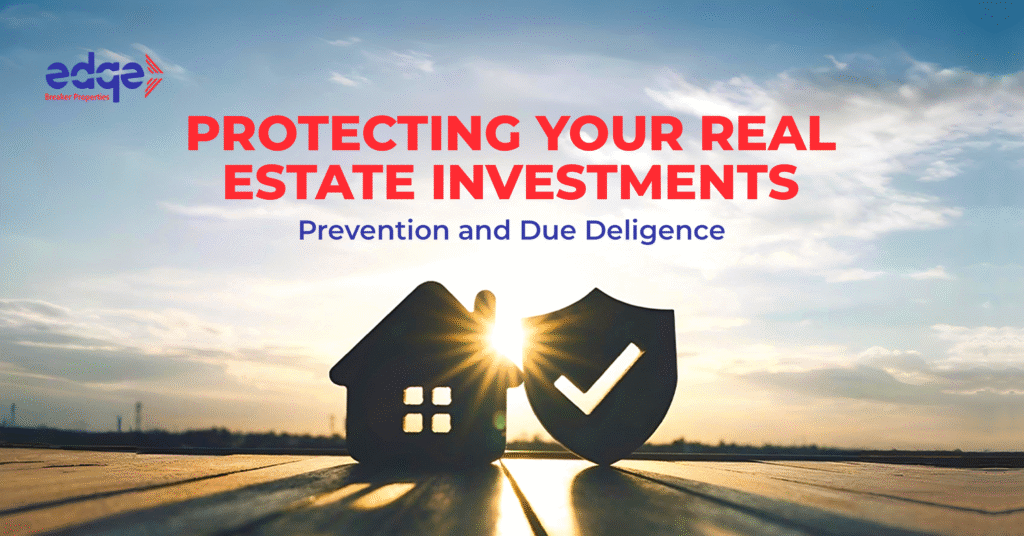PROTECTING YOUR REAL ESTATE INVESTMENTS: PREVENTION AND DUE DILIGENCE.

Real estate is one of the most lucrative and stable forms of investment, but it is not without risks. From title issues to fraudulent sellers, poor property conditions, and bad locations, many things can go wrong. To protect your investment, prevention and due diligence must be part of your strategy not an afterthought.
In this article, we will explore the key ways to protect your real estate investment before, during, and after purchase.
• Understanding the Importance of Due Diligence
Due diligence is the investigative process every smart investor should conduct before acquiring a property. It helps you verify all facts about the property, seller, and potential returns. Skipping this step is like buying a car without checking the engine you may be headed for disaster.
Key elements of real estate due diligence:
Title verification: Ensures the seller is the rightful owner and that the title is clean, free from encumbrances or litigation.
Survey and boundaries: Confirms the actual size and limits of the land or property.
Zoning laws and permits: Checks the legality of the property’s current or intended use.
Physical inspection: Uncovers structural issues, repairs needed, or environmental concerns.
Market analysis: Evaluates the appreciation potential, demand, and neighborhood trends.
• How to Prevent Fraud and Bad Investments
Prevention is better than cure, especially in real estate. Here are actionable tips to avoid falling victim to scams or poor investments:
a. Work With Professionals
Engage registered real estate agents, lawyers, surveyors, and valuers. These professionals help you spot red flags and ensure the transaction follows legal processes.
b. Verify Documents Independently
Don’t rely solely on what the seller shows you. Visit land registry offices, government planning agencies, and other regulatory bodies to confirm ownership and approvals.
c. Avoid “Too Good to Be True” Deals
If the price is significantly below market value, there may be hidden issues like land disputes, illegal developments, or flood risks.
d. Demand Proper Receipts and Agreements
Ensure all payments and transactions are documented and signed. A properly executed Deed of Assignment, Purchase Agreement, and Survey Plan are vital.
• Post-Purchase Protection Measures
The protection of your investment doesn’t stop after buying. Here’s how to secure it long-term:
a. Secure the Property
Fence it, mark boundaries clearly, and install basic security if it’s a developed property. This discourages encroachment and land grabbing.
b. Process Title Perfection
If you bought with a C of O (Certificate of Occupancy) or other registered title, ensure it’s transferred to your name and registered accordingly.
c. Develop or Use the Land
Idle land is often targeted by trespassers. Consider light development, leasing, or even farming to establish presence and discourage encroachment.
d. Maintain Regular Monitoring
If you live far away, assign a trusted local contact or use a property management service to periodically check the site.
• Red Flags That Signal Caution
Even experienced investors sometimes miss early warning signs. Be cautious if:
The seller cannot provide original documents.
Multiple people claim ownership of the same land.
There’s pressure to pay quickly without full verification.
Access to the property is blocked or disputed.
The neighborhood is experiencing legal demolition or community disputes.
• The Role of Insurance in Real Estate Investment
Consider insuring your property against fire, theft, or natural disasters, especially for developed properties. Title insurance is also growing in popularity as a way to protect against hidden legal claims on property ownership.
• Case Studies: Learning from Real Experiences
Case 1: Land Encroachment Due to No Fencing
A Lagos investor bought 2 plots in a fast-growing area but didn’t fence or visit for over a year. On return, the land had been resold and was under construction by another party. No documentation was registered.
Lesson: Always fence, visit regularly, and register ownership with the local authority.
Case 2: Buying Disputed Land
An investor was offered a plot at half the market price but failed to consult a lawyer. Months later, they were dragged into a community land ownership lawsuit.
Lesson: Cheap is not always good. Always conduct legal checks and verify community agreements.
Final Thoughts
Real estate investment is not a gamble—it’s a calculated risk. The more you know, the safer your money will be. Prevention and due diligence may cost you time and some money upfront, but they save you from costly mistakes and legal battles later.
In real estate, the best investors are not just the ones who buy but those who buy smart.
Reference
Oluwatosin Damilare

